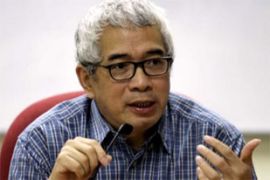HK reporter freed from Chinese jail
Journalist convicted of spying for Taiwan expected home for New Year holiday.

Ching, 58, was arrested while visiting the southern city of Guangzhou in April 2005 and was sentenced to five years in jail after a one-day trial 16 months later.
An appeal against his conviction was rejected in November 2006 and he was moved from Beijing to a prison in southern Guangdong province in January last year.
Reunion
A statement from Singapore Press Holdings, publisher of The Straits Times, said it was “delighted” at the news of Ching’s “long-awaited release”.
“We are very happy that he will be reunited with his wife and family for Chinese New Year. We look forward to meeting him as soon as possible.”
State media said Ching was convicted of selling unspecified “state secrets and intelligence” to an unnamed Taiwanese foundation allegedly posing as a front for Taiwan intelligence gathering activities on the mainland.
Ching’s family and supporters had been pushing for an early release as he had been suffering from bad health.
Ching was one of at least 29 journalists detained in China, which according to the Committee to Protect Journalists, a New York-based advocacy group, jails more reporters than any other country.
Activist jailed
News of Ching’s release came on the same day it emerged that a Chinese court jailed a democracy activist who four years ago wrote about corruption within the local government.
Lu Gengsong, who went on trial two weeks ago, was convicted of “inciting subversion of state power” and sentenced to four years in jail by the Intermediate People’s Court in Hangzhou, a resort city near Shanghai.
His wife, Wang Xue’e, said no questions or statements were allowed as Lu was led away immediately after the sentencing which lasted less than 20 minutes.
“The judge began to read the sentence immediately. No questions could be asked and there was no chance for any of us to say anything,” she said. “I asked the judge if I could meet my husband for a minute but he refused.”
According to his wife, Lu became a freelance writer in 1993 after he was fired from a teaching job at a police training academy.
Mo Shaoping, Lu’s lawyer, said his client faced subversion charges based on 19 articles he had posted on the internet, and that he would appeal the decision.